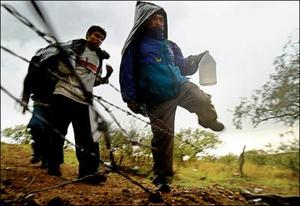ImmigrationStudy: U.S. immigration policy perpetuates poverty
A new study says that the U.S. current immigration system — that is, the legal immigration system — is dysfunctional in that it is not responsive to the socioeconomic conditions of the United States; the main flaw in the current system — a flaw, the report argues, which will be exacerbated by allowing millions of undocumented immigrants to become citizens — is that only a small share of legally admitted immigrants is sponsored by employers while the bulk are admitted because of family ties to earlier immigrants who may be living in poverty or near poverty

Illegal immigrants negatively impact the workplace // Source: continentaldivide.us
A new report by the Federation for Immigration Reform (FAIR) says that allowing millions of undocumented immigrants to get on a path to citizenship will increase poverty in the United States.
The report, “Immigration, Poverty and Low-Wage Earners: The Harmful Effect of Unskilled Immigrants on American Workers,” says the reason is that today’s immigration system—that is, the legal immigration system — is dysfunctional in that it is not responsive to the socioeconomic conditions of the United States. The main flaw in the current system – a flaw, the report argues, which will be exacerbated by allowing millions of undocumented immigrants to become citizens – is that only a small share of legally admitted immigrants is sponsored by employers while the bulk are admitted because of family ties to earlier immigrants who may be living in poverty or near poverty. As a result, immigration contributes to an already-existing surplus of low-skilled workers, increasing job competition, and driving down wages and conditions to the detriment of American workers.
The presence of a large illegal workforce perpetuates a vicious cycle as degraded work conditions discourage Americans from seeking these jobs and make employers more dependent on an illegal foreign workforce. “America’s massive low-skill labor force and illegal alien population allow employers to offer low pay and deplorable conditions,” the report says.
The FAIR study goes on to say that these harmful effects of the immigration system were recognized in the reports of the U.S. Commission on Immigration Reform in the mid 1990s. The Commission’s immigration reform recommendations were welcomed by President Bill Clinton and submitted to Congress, but have largely been ignored since then. As a result, conditions for America’s poorest workers have continued to deteriorate because of both illegal and legal immigration.
FAIR says that reform of the immigration system to assure that it does not harm Americans and instead contributes to a stronger more equitable society is long overdue. “The reforms that are needed include ending family-based chain migration and unskilled immigration, ending the job competition for America’s most vulnerable citizens by curtailing illegal immigration and unskilled legal immigration, and holding employers accountable for hiring illegal workers.”
FAIR says that the United States has a responsibility to protect the economic interests of all of its citizens, yet the current immigration system, which adds hundreds of thousands to the labor force each year, is bringing in workers faster than jobs are being created.
In 1995, the
